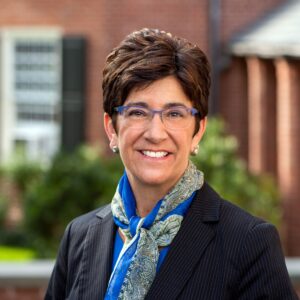Conversation with the keynoter
Apr 18, 2023

© Photo by Mara Lavitt
October 14, 2021
Yale Divinity School Quad, New Haven, CT
Andover Newton Divinity School at Yale staff.
The Rev. Dr. Sarah B. Drummond, founding dean of Andover Newton Seminary at Yale Divinity School, will deliver the keynote address at the 2023 Annual Meeting of the Wisconsin Conference UCC. Ordained in the UCC, Sarah is no stranger to Wisconsin: She holds a doctorate in administrative leadership from UW-Milwaukee, and she served as campus minister and executive director of University Christian Ministries, an ecumenical outreach at UWM. Sarah is the author of two books on leadership. Her talk, “Sharing Leadership into the Future,” will examine how the UCC’s model of leadership sharing will play out in uncertain times. This conversation has been edited for length and clarity.
Why is your topic important to the church right now?
We’re in the midst of a quickly changing time for religion in North America. We don’t know what God is doing, and that’s OK. We can still be effective leaders, even though we might not live to see what God is up to right now.
I intend to offer a framework for how to think about leadership amid a time when there is no obvious true north. The world is becoming more UCC in approaching leadership: The model of top-down leadership is going away. Except for Jesus, the UCC never operated that way.
You contrast rational, strategy-focused, business-style leadership with what the church needs today. Can you explain?
We’re not at a time when a leader can pull out the old business tricks from 30 or 40 years ago. The assumption of business researchers is that a rational actor is at work, trying to maximize benefit to themselves. The job of the leader is to get community together around a vision for the future and overcome obstacles on the way to it. Today, we don’t have enough clarity about the future to formulate a goal for it. There are different leadership skills that are needed now. We need to allow the future to become more formed. Then we can get all goal-oriented again. By trying to be super rational, we lose the best part of being part of a faith community – relationships.
What is the alternative?
My next book is tentatively titled “Leading with Wonder and Wherewithal.” I would contrast wonder and wherewithal with strategy-based leadership. I propose that we bring to our work “Oh, wow. What is God up to?” Wow, rather than a crisis mentality. Then we need wherewithal and buckle down and work hard.
We need to learn how to function amid ambiguity. “I will have succeeded when I figure out what God is up to” is a functionally atheistic worldview. We are not to know the mind of God. We see but through a mirror dimly. And that’s by design.
Can you offer some examples of the skills leaders need today?
Certain leadership functions have become more important than we realized they were. One is the capacity of leadership to build community and build relationships. The ability for a leader to work through conflict has never been more important. Even more important is the capacity to help a community discern why it has to exist and say it in words and then be that.
One of the tensions is that we need to think about the community as a whole and attend to individuals, too. Maybe I need to call three individuals in the congregation to see how they’re doing.
High-velocity change seems to be all around us, and the church is no exception. What kinds of leaders do these circumstances demand?
When you’re leading in uncertain times, you still have to inspire confidence. You still have to come across as competent, as Susan Beaumont says. There are specific things you do: Walk with God, not wait on God. And the biggest mistake we make in our churches is to try to get closer to God but lose touch with each other.
One of the aphorisms I use is my own work is: There’s slow and there’s careful. You can be slow and careless. You can be fast and careful. When somebody says it’s happening too fast, my questions are: “What stone did we leave unturned. What data are we missing?”
Good leaders are deeply thoughtful. Sometimes we have to go slower to be careful. But I’ve seen bad slow leaders.
Do the same rules apply to lay leaders?
Absolutely. I’m UCC. In my theology, there’s no room for ministers thinking they’re closer to God or the Holy Spirit. The roles are different, that’s all. Roles and gifts and the way people experience a call are all God given. I think sometimes people mistake UCC theology to say ordained ministry isn’t sacred. No. All work is sacred. Call is real. God is calling all of us.
What does it mean to be a disciple of Jesus in a world emerging from a three-year pandemic, and where loyalty to institutions like the church can no longer be assumed? Those questions prompted the theme of the 2023 Annual Meeting of the Wisconsin Conference UCC: “Changing Church: Following Jesus Forward.” Annual Meeting will be held June 9-11 at the Green Lake Conference Center in Green Lake. Register now.
‹ Back to News & Updates



Sign up for our newsletter!
Find us on
Contact Us